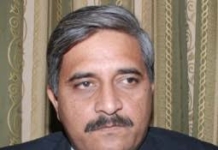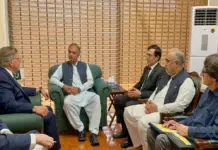In a blatant misuse of Its UN Security Council’s membership, India has blocked a proposal to proscribe an Indian national, Gobinda Patnaik Duggivalasa, by a 15-member body’s panel, known as the 1267 Sanctions Committee, according to the informed sources.
The Committee procedures require the consent of all Council members to accept a listing request. The proposal for listing of Gobinda Patnaik Duggivalasa was tabled in the Committee because of his role in financing and supporting terrorist attacks against Pakistan, including the 13 July 2018 suicide bomb attack in Mastung, Balochistan, that he planned, coordinated and executed. Over 160 individuals lost their lives and more than 200 were injured in that attack.
Duggivalasa was also involved in a suicide attack on a bus carrying Chinese nationals in Dalbandin, Balochistan, on 11 August 2018, the sources said. This individual is part of India’s state-sponsored terrorist network responsible for unifying various Tehreek-e Taliban Pakistan (TTP) factions in the past in Afghanistan, they said. Recent reports of the UN Monitoring Team focusing on the global threat posed by Al-Qaeda, Daesh and related groups have highlighted the increasing cross-border terrorist threat posed by proscribed TTP to Pakistan from the Afghan soil as a result of the reunification of the group in Afghanistan.
Pakistan, according to the sources, has shared concrete evidence of the involvement of Indian intelligence agencies in sponsoring UN-listed terrorist organizations such as TTP and Jamaat-ul-Ahrar (JuA) in cross-border terrorist attacks against the Pakistani military and civilian targets. India’s blocking of the listing proposal, including by asserting political pressure on other members of the Committee, shows India’s “farcical” stance on terrorism as well as its misuse of the UN’s counter-terrorism mechanisms, the sources.
Facing growing criticism in the international media about its atrocities in Indian Illegally Occupied Jammu and Kashmir (IIOJK) as well as mainstreaming of Islamophobia in its political discourse, Indian diplomats have been making the UN a venue for peddling New Delhi’s disinformation campaign against Pakistan to divert attention from its domestic situation.
Earlier, on Friday, the Foreign Office had said there was no change in Pakistan’s policy on India on which there was national consensus, clarifying that Foreign Minister Bilawal Bhutto Zardari’s remarks the other day were interpreted out of context and portrayed incorrectly. In a statement, the Foreign Office spokesperson said that the foreign minister’s remarks were better understood in the overall context of his key message of conflict resolution that he emphasized in his address at the Institute of Strategic Studies Islamabad (ISSI) on Thursday.
In response to media queries about remarks made by the foreign minister regarding relations with India in his address at the ISSI, the spokesperson stated that these were being interpreted out of context and portrayed incorrectly. Referring to India’s illegal and unilateral actions in the Indian Illegally Occupied Jammu and Kashmir since August 5, 2019, the spokesperson said the foreign minister described them as an assault on the rights of the Kashmiri people.
He added that Foreign Minister Bilawal also dilated on rising Islamophobia in India that had created an environment unconducive for a meaningful engagement. “The foreign minister’s remarks are better understood in the overall context of his key message of conflict resolution that he emphasised in his address at the think-tank event,” the spokesperson added. “Pakistan has always desired cooperative relations with all its neighbours, including India. We have consistently advocated constructive engagement and result-oriented dialogue to resolve all outstanding issues, including the core Jammu and Kashmir dispute,” the spokesperson said. “It is, however, India’s unabated hostility and retrogressive steps that have vitiated the environment and impeded the prospects of peace and cooperation. The onus, therefore, remains on India to take the necessary steps to create an enabling environment conducive for meaningful and result-oriented dialogue.”
Describing Pakistan as “internationally isolated and disengaged”, Foreign Minister Bilawal Bhutto Zardari had on Thursday said engagement with other countries, including India and the United States, was important for the country in view of the emerging geopolitical developments. “An internationally isolated or disengaged Pakistan cannot achieve the goals of development and prosperity,” he said at an event held at the ISSI. He said recently Pakistan went down on an “unhealthy path” of disconnect with other countries that directly put a negative impact not only on the country’s foreign and strategic policy but also on the economy and lives of average Pakistanis.








Comments are closed.